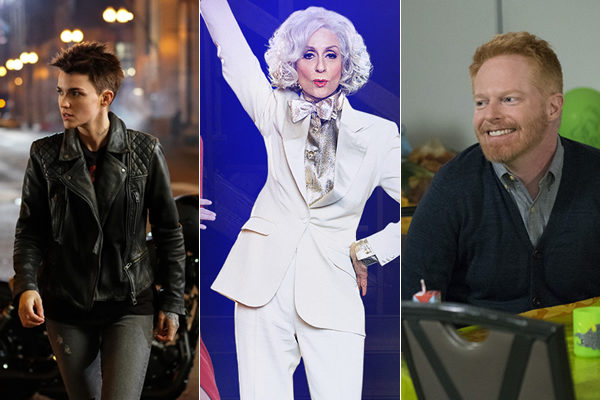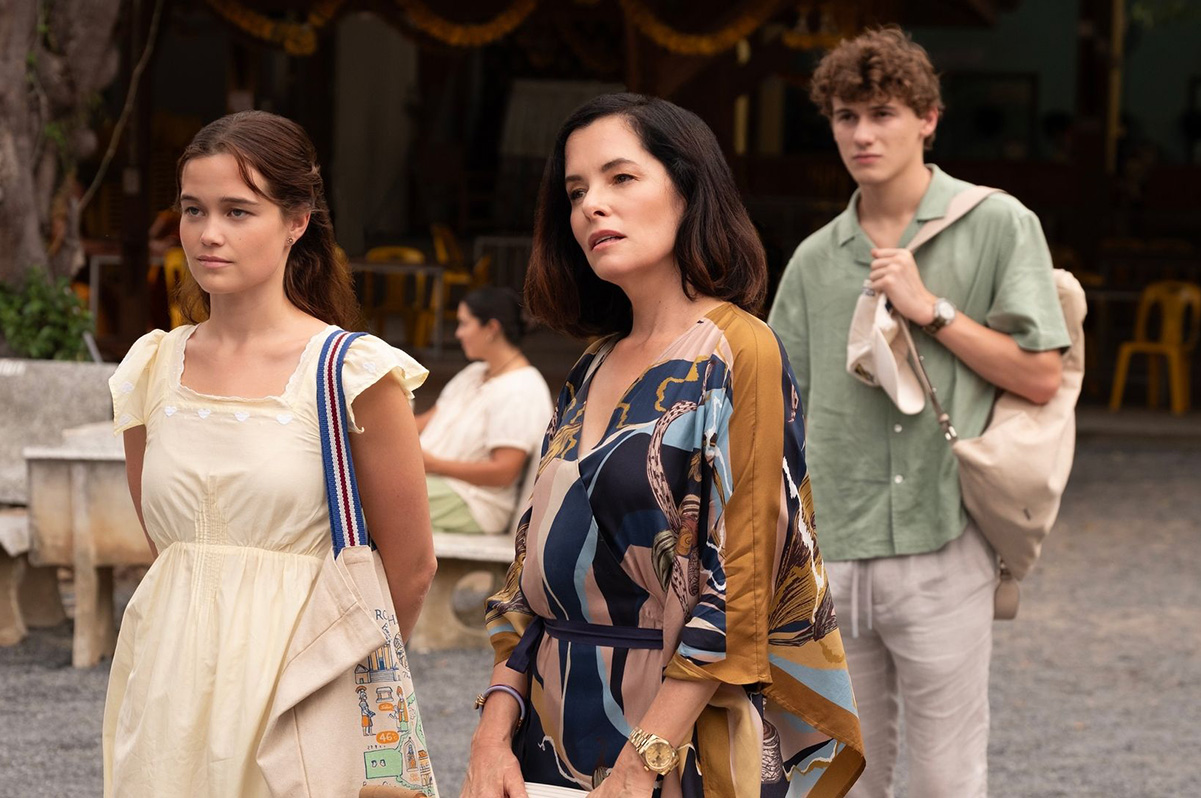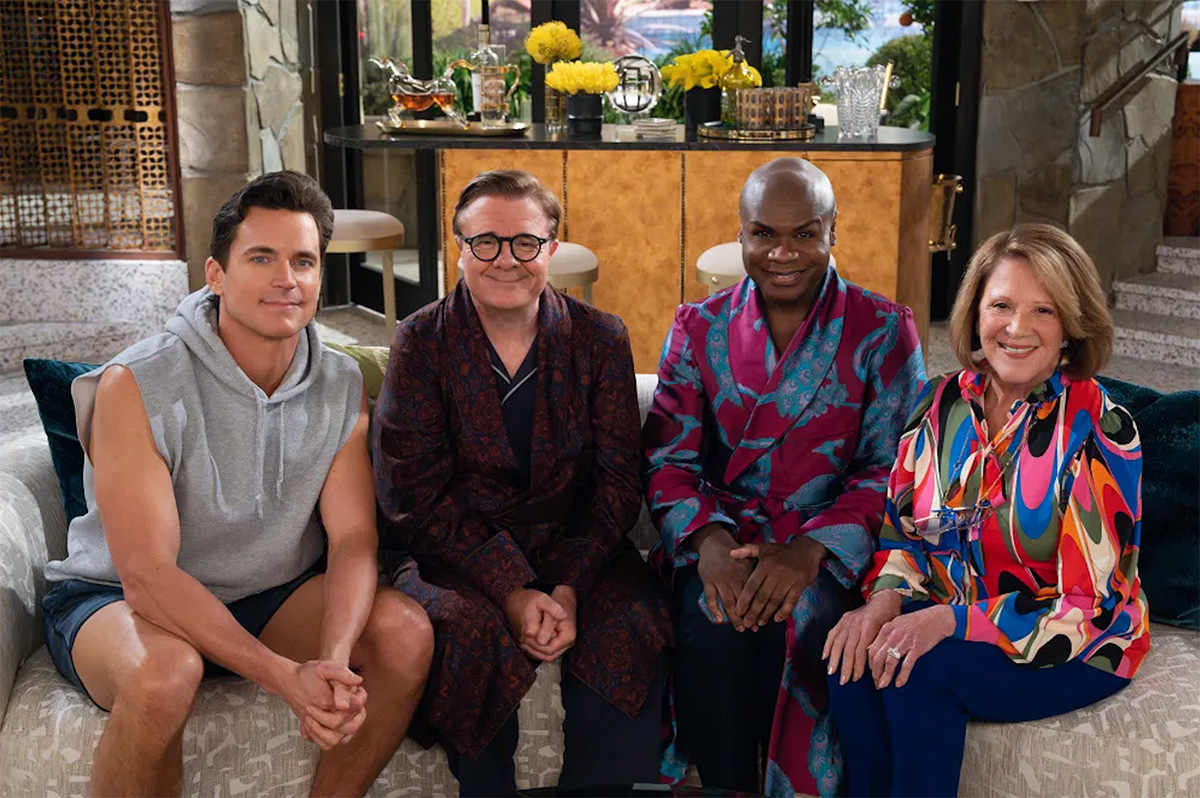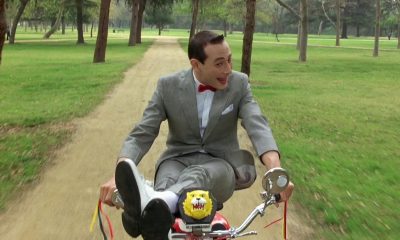Television
FALL ARTS 2019 TV — It’s a wrap for ‘Modern Family,’ ‘Transparent’ et. al.
‘AHS’ revisits ‘80s with new season; ‘Dark Crystal’ prequel is unexpected hit


The fall 2019 TV season got off to a delightful and unexpectedly queer start with the arrival of “The Dark Crystal: Age of Resistance” on Netflix. A prequel to the 1982 cult classic movie directed by Jim Henson and Frank Oz, the 10-episode series returns to the world of Thra where a brave band of Gelflings are fighting against the evil Skeksis.
Like the movie, the series uses amazing puppetry (with some mechanical augmentation) instead of CGI. The all-star voice cast includes Taron Egerton, Helena Bonham Carter, Sigourney Weaver, Eddie Izzard, Lena Headly, Gugu Mbatha-Raw, Alicia Vikander, Simon Pegg, Harvey Fierstein and Awkwafina.
As the series unfolds, it is revealed that Deet (voiced by Nathalie Emmanuel), one of the leaders of the Gelfling rebellion, has two dads. The show also features a lesbian relationship between Tavra (Caitriona Balfe) and Onica (Natalie Dormer).
Described as “’Game of Thrones’ with puppets,” the series has premiered to popular and critical acclaim, especially from LGBT fans.
Netflix has also dropped season two of “Élite,” a Spanish language drama that includes a resident gay couple and frank discussions of sexuality, HIV, polyamory and murder.
The ninth season of “American Horror Story” will start stalking FX viewers on Sept. 18. Inspired by horror/slasher movies from the 1980s, “1984” will star Emma Roberts and openly gay Olympic silver medalist Gus Kenworthy. The cast will also include Sarah Paulson, Billie Lourd, Cody Fern, Matthew Morrison and trans actress Angelica Ross (“Pose”); exhausted series regular Evan Peters is taking the season off.
Pro tip: If you don’t subscribe to FX, you can start streaming AHS season eight (the excellent “Apocalypse”) on Netflix on Sept. 24.
On Sept. 22, ESPN will present “Mack Wrestles,” a 30-minute documentary film about Mack Beggs, a high school transgender wrestler from Texas.
The ground-breaking Amazon series “Transparent” will go out with a big splash on Sept. 27. After the fourth season dropped in September, 2017, the series was buffeted by accusations of sexual harassment against star Jeffrey Tambor, who was fired from the show. Creator Jill Soloway decided to end the series with a feature-length musical instead of the planned fifth and final season. “Transparent: Musicale Finale” will include the death of Tambor’s character, trans woman Maura Pfefferman.
The latest series from gay media guru Ryan Murphy premieres on Netflix on Sept. 27. “The Politician” stars out actor Ben Platt as a ruthless teen who wants to be president of his high school class, and then president of the United States. Gwyneth Paltrow plays his mother; the cast also includes gay icons Bette Midler and Jessica Lange.
Several shows with LGBT characters will be starting their final seasons in September, including “9-1-1” (Sept. 23), “The Good Doctor” (Sept. 23), “Empire” (Sept. 24), “Modern Family” (Sept. 25), “The Good Place” (Sept. 26) and “How to Get Away With Murder” (Sept. 26).
Returning series with prominent LGBT characters include in “The Conners” (Sept. 24) and “Grey’s Anatomy” (Sept. 26) and “Superstore” (Sept. 26).
Meanwhile on the CW, LGBT and LGBT-affirming series new and old will leap into action in October. New to the schedule is “Batwoman,” which stars Ruby Rose as Bruce Wayne’s lesbian cousin Kate Kane. Returning superhero shows include “Supergirl,” “Arrow” (series finale), “Black Lightning” and “The Flash.” Other returning series include “Dynasty,” “Supernatural” (series finale) and “Riverdale.”
Netflix continues to taunt the Academy by offering its movies in (very) limited theatrical release before it streams them. (It’s not clear yet if these movies will hit D.C. theaters.) This fall’s hybrid prestige projects include “The King” with Timothée Chalamet as King Henry V and Joel Edgerton as the troublesome Falstaff (streaming on Nov. 1), Martin Scorsese’s three-and-a-half hour crime epic “The Irishman” (Nov. 27), and Noah Baumbach’s “Marriage Story” with Adam Driver and Scarlet Johansson (slated to stream on Dec. 6).
HBO will air the documentary “Very Ralph” about openly gay fashion designer Ralph Lauren starting on Nov. 12. Other HBO programming with queer content includes the final season of “The Deuce” starring James Franco and Maggie Gyllenhaal (already underway) and “Mrs. Fletcher” (Oct. 27). Other notable programming includes “Watchmen,” based on the DC Comics series and starring Regina King, Jeremy Irons, Don Johnson, Jean Smart (Oct. 20) and “Catherine the Great” starring Helen Mirren as the imperious czarina and Jason Clarke as the infamous Potemkin (Oct. 21).
Also expected in 2019 is an adaptation of Philip Pullman’s award-winning trilogy “His Dark Materials.”
Season three of the popular “The Marvelous Mrs. Maisel” debuts to Amazon on Dec. 6. The series, starring Rachel Brosnahan as an aspiring New York comic in the 1950s, has won awards for its great comedy and its examination of gender and class issues, but queer critics have been disappointed by series creator Amy Sherman-Palladino’s coy treatment of sexuality on the show. Mrs. Maisel’s manager Susie (the terrific Alex Borstein) is coded as a butch lesbian, complete with a leather jacket, jeans and a fisherman’s cap, but the series has yet to address the character’s private life. Maybe they’ll crack open the closet door this season.
Finally, on Dec. 8, an old favorite returns to Showtime. Featuring a new theme song by Lizzo, “The L Word: Generation Q” revives the lesbian-focused drama that ran from 2004-2009. Returning cast members Jennifer Beals (Bette Porter), Katherine Moening (Shane McCutcheon) and Leisha Hailey (Alice Pieszecki) are joined by several new faces; the action is moved from West Hollywood to Silver Lake.
No word yet on a third season of “Pose” (it’s early, though; season two just finished). “RuPaul’s Drag Race” has been renewed for a 12th season but no premiere date has been announced. Same for “All Stars,” which will be back for a fifth season, probably in 2020. “RuPaul’s Drag Race UK” is slated for an Oct. 3 premiere on BBC Three, an online service. No word yet on Ru’s daytime talk show, which had a promising test run in June.
Television
‘White Lotus,’ ‘Severance,’ ‘Andor’ lead Dorian TV Awards noms
‘Voters have a special affinity for stories of self-discovery’

As the Academy of Television Arts and Sciences wrapped up the voting for nominations in its annual race for the Emmy Awards this week, much of Hollywood (and countless fans with favorite contenders of their own) was buzzing with speculation about who and what will be included when the final slate of nominees is announced on July 15 – but just in time for Pride Month, GALECA (The Society of LGBTQ Entertainment Critics) has stolen a bit of its thunder.
The second largest entertainment journalists group in the world, GALECA is made up of 560 members who, as the group’s press release proudly states, ”write and work for some of the most respected and buzz-worthy media outlets in the U.S. and beyond.” Last week, the organization announced its list of nominees for the 16th Annual Dorian TV Awards, representing the “queer eye’s” choices for the best in television and streaming, among both mainstream and LGBTQ content – and the list of contenders includes an exciting mix of A-listers, icons, and up-and-coming stars. This year’s performance and tribute categories – all of which are non-gendered – recognize such established talent as Beyoncé, Jean Smart, Colin Farrell, Colman Domingo, Michelle Williams, Pedro Pascal, Natasha Lyonne, Uzo Aduba, Bella Ramsey, Noah Wyle, and current flavor-of-the-day “daddy” Walton Goggins, alongside such lesser-known names as Ncuti Gatwa, Katherine LaNasa, Owen Cooper, and (as GALECA puts it) “the actress who simply calls herself Holmes.”
For those unfamiliar with GALECA, it’s not just an organization that gets together to give out awards – though it presents Dorians for film, television, and theater at separate times during the year, its stated mission is to “remind society that the world values the informed LGBTQ perspective on all things entertainment.” A nonprofit organization, they advocate for better pay, access, and respect for entertainment journalists (especially from underrepresented demographics), and provide scholarships for LGBTQ journalism students.
As for this year’s nominated shows, there’s an equally exciting mix of competitors. In the Best Drama categories, three critical and popular hits – the surreal and unpredictable Apple TV+ office drama “Severance,” the unabashedly anti-fascist and queer-inclusive Disney Plus “Star Wars” prequel series “Andor,” and HBO/Max’s irresistibly provocative hotel drama “The White Lotus” – are in the race with six Dorian nominations each, while two others – gritty medical drama “The Pitt” and video-game-inspired sci-fi zombie saga “The Last of Us” – are close behind them with five each.
In the comedy department: HBO/Max’s “Hacks,” already a two-time Dorian winner in the Best Comedy category, leads the pack with its own six nods, and the same streamer’s upbeat dramedy “Somebody Somewhere” grabbed four, while ABC’s “Abbott Elementary” (another two-time winner) pulled in three. Other contenders include the colorful new Apple TV+ Hollywood satire “The Studio” and season two of “The Rehearsal,” creator-star Nathan Fielder’s hard-to-categorize HBO/Max offbeat “societal experiment” that endeavors to teach “average folks” how to deal with various wildly-hypothetical life problems.
According to GALECA Executive Director Diane Anderson-Minshall: “By loving-up series like ‘Hacks,’ ‘Somebody Somewhere,’ and even ‘The Rehearsal’ and ‘Andor’ – a sci-fi story of the beginnings of a major rebellion – Dorian Award voters once again have shown they have a special affinity for stories of self-discovery and pushing for more. Like generations of LGBTQ+ people who took on the battle for the right to be who they are, these nominated programs underscore that solidarity, morality, and justice aren’t just for superheroes, but can be found in small daily actions.”
The same empathy for underdogs can be perceived behind one of GALECA’s other awards, the unique Best Unsung Series category, which amplifies shows its members believe deserve greater attention. This year’s contenders include quirky queer creator Julio Torres’ wickedly inventive and amusingly absurd HBO satire “Fantasmas” and the final season of Paramount+’s controversial-but-popular supernatural drama “Evil,” as well as Hulu’s irreverent “English Teacher” (from queer creator/star Brian Jordan Alvarez) and Amazon Prime’s “Overcompensating,” about a former high school jock and closeted college freshman, inspired by the college experiences of creator and star, social media and internet comedian Benito Skinner, who also received a Dorian nod for his acting in the show.
Of course, there’s also a category for the Best LGBTQ Series, which singles out television content of particular relevance to queer viewers. This year, crossover titles “Hacks,” “Somebody Somewhere,” and “Overcompensating” are nominated here, too, alongside the third season of Netflix’s beloved YA romance “Heartstopper” and the campy Disney+ Marvel spinoff “Agatha All Along,” which also scored a nod in the Musical Performance category for “The Ballad of the Witch’s Road.”
Speaking of camp, the Dorians would not be complete without GALECA’s most irreverent award. In the category of Campiest TV Show, “Agatha” is (surprisingly, perhaps) not among the nominees; however, Hulu’s exceptionally queer throwback sitcom “Mid-Century Modern,” which features stars Nathan Lane, Nathan Lee Graham and Matt Bomer as three gay besties who retire to Palm Springs together most deservedly is. The show – touted as a “gay ‘Golden Girls’” – also earned a posthumous Supporting Performance nod for beloved TV and Broadway legend Linda Lavin, who passed away before the series wrapped production late in 2024. Its competitors are Peacock’s deliciously dramatic Alan Cumming-led reality show “The Traitors,” Ryan Murphy’s over-the-top seafaring medical drama “Doctor Odyssey,” the aforementioned “Overcompensating,” and MTV’s eternal GALECA darling “RuPaul’s Drag Race.”
Among other award categories: Best TV Movie or Miniseries, which includes nominees like Netflix’s “Rebel Ridge” and HBO/Max’s “The Penguin”; Best Documentary and Best LGBTQ Documentary, both of which include HBO/Max’s heartfelt “Pee-wee as Himself”; Most Visually Striking Show, which highlights the design aesthetic of shows like “Andor” and “Agatha”; and Best Animated Show, which pits longtime favorites like “The Simpsons” and “Bob’s Burgers” against newer contenders like “Harley Quinn” and “Big Mouth.”
Finally, there are also some “honorary” awards to recognize the career-long impact and influence of their winners: the Wilde “Wit” Award, the TV Icon Award, and the LGBTQIA+ TV Trailblazer Award, each of which includes a host of groundbreaking talents among its nominees.
Clearly, though the Dorians don’t get the same glam treatment as many of the industry’s more “mainstream” award ceremonies, they have the impeccable taste one naturally expects from a panel of queer experts, and chances are good that – as is often the case – their choices will serve as a preview for what happens when the Emmys finally roll out their own red carpet.
Winners will be announced Tuesday July 8 at 8am PST. A full list of nominees is below.
2025 DORIAN TV AWARD NOMINATIONS—FULL LIST
BEST TV DRAMA
Andor (Disney+)
The Last of Us (HBO/Max)
The Pitt (Max)
Severance (Apple TV+)
The White Lotus (HBO/Max)
BEST TV COMEDY
Abbott Elementary (ABC)
Hacks (HBO/Max)
The Rehearsal (HBO/Max)
Somebody Somewhere (HBO/Max)
The Studio (Apple TV+)
BEST LGBTQ TV SHOW
Agatha All Along (Disney+)
Hacks (HBO/Max)
Heartstopper (Netflix)
Overcompensating (Amazon Prime)
Somebody Somewhere (HBO/Max)
BEST TV MOVIE OR MINISERIES
Adolescence (Netflix)
Bridget Jones: Mad About the Boy (Peacock)
Dying for Sex (FX on Hulu)
The Penguin (HBO/Max)
Rebel Ridge (Netflix)
BEST WRITTEN TV SHOW
Andor (Disney+)
Hacks (Max)
The Pitt (Max)
Severance (Apple TV+)
The White Lotus (HBO/Max)
BEST UNSUNG TV SHOW
English Teacher (FX on Hulu)
Evil (Paramount+)
Fantasmas (HBO/Max)
Mid-Century Modern (Hulu)
Overcompensating (Amazon Prime)
BEST NON-ENGLISH LANGUAGE TV SHOW
Threesome (ViaPlay)
My Brilliant Friend (HBO/Max)
One Hundred Years of Solitude (Netflix) (tie)
Elite (Netflix) (tie)
Pachinko (Apple TV+)
Squid Game (Netflix)
BEST LGBTQ NON-ENGLISH LANGUAGE TV SHOW
Becoming Karl Lagerfeld (Hulu)
The Boyfriend (Netflix)
Elite (Netflix)
The Secret of the River (Netflix)
When No One Sees Us (HBO/Max)
BEST TV PERFORMANCE—DRAMA
Colin Farrell, The Penguin (HBO/Max)
Stephen Graham, Adolescence (Netflix)
Cooper Koch, Monsters: The Lyle and Erik Menendez Story (Netflix)
Diego Luna, Andor (Disney+)
Cristin Milioti, The Penguin (HBO/Max)
Pedro Pascal, The Last of Us (HBO/Max)
Bella Ramsey, The Last of Us (HBO/Max)
Adam Scott, Severance (Apple TV+)
Michelle Williams, Dying for Sex (FX on Hulu)
Noah Wyle, The Pitt (HBO/Max)
BEST SUPPORTING TV PERFORMANCE—DRAMA
Owen Cooper, Adolescence (Netflix)
Carrie Coon, The White Lotus (HBO/Max)
Taylor Dearden, The Pitt (HBO/Max)
Erin Doherty, Adolescence (Netflix)
Walton Goggins, The White Lotus (HBO/Max)
Katherine LaNasa, The Pitt (HBO/Max)
Genevieve O’Reilly, Andor (Disney+)
Parker Posey, The White Lotus (HBO/Max)
Jenny Slate, Dying for Sex (FX on Hulu)
Tramell Tillman, Severance (Apple TV+)
BEST TV PERFORMANCE—COMEDY
Uzo Aduba, The Residence (Netflix)
Quinta Brunson, Abbott Elementary (ABC)
Ayo Edebiri, The Bear (FX on Hulu)
Bridget Everett, Somebody Somewhere (HBO/Max)
Nathan Fielder, The Rehearsal (HBO/Max)
Kathryn Hahn, Agatha All Along (Disney+)
Natasha Lyonne, Poker Face (Peacock)
Seth Rogen, The Studio (Apple TV+)
Benito Skinner, Overcompensating (Amazon Prime)
Jean Smart, Hacks (HBO/Max)
BEST SUPPORTING TV PERFORMANCE—COMEDY
Ike Barinholtz, The Studio (Apple TV+)
Colman Domingo, The Four Seasons (Netflix)
Hannah Einbinder, Hacks (HBO/Max)
Holmes, Overcompensating (Amazon Prime)
Janelle James, Abbott Elementary (ABC)
Kathryn Hahn, The Studio (Apple TV+)
Jeff Hiller, Somebody Somewhere (HBO/Max)
Linda Lavin, Mid-Century Modern (Hulu)
Catherine O’Hara, The Studio (Apple TV+)
Meg Stalter, Hacks (HBO/Max)
BEST TV MUSICAL PERFORMANCE
Beyoncé, “Cowboy Carter” medley, Ravens vs. Texans Halftime Show (Netflix)
Doechii, “Catfish” / “Denial Is a River,” 67th Annual Grammy Awards (CBS)
Cynthia Erivo, Ariana Grande, “The Wizard of Oz” / “Wicked” medley, 97th Academy Awards (ABC)
Kathryn Hahn, Patti LuPone, Ali Ahn, Sasheer Zamata, “The Ballad of the Witches’ Road,” Agatha All Along (Disney+)
Kendrick Lamar, “Squabble Up,” “Humble,” etc., Super Bowl LIX Halftime Show (Fox)
BEST TV DOCUMENTARY OR DOCUMENTARY SERIES
Deaf President Now! (Apple TV+)
Elizabeth Taylor: The Lost Tapes (Max)
Pee Wee as Himself (HBO/Max)
The Rehearsal (HBO/Max)
SNL50: Beyond Saturday Night (NBC)
BEST LGBTQ TV DOCUMENTARY OR DOCUMENTARY SERIES
Disco: Soundtrack of a Revolution (PBS)
Fanatical: The Catfishing of Tegan and Sara (Hulu)
Outstanding: A Comedy Revolution (Netflix)
Pee Wee as Himself (HBO/Max)
Queer Planet (Peacock)
BEST CURRENT AFFAIRS SHOW
(Talk show or news/information program)
The Daily Show (Comedy Central)
Hot Ones (YouTube)
Everybody’s Live With John Mulaney (Netflix)
Late Night with Seth Meyers (NBC)
Last Week Tonight with John Oliver (HBO/Max)
BEST REALITY SHOW
The Amazing Race (CBS)
The Great British Baking Show (Netflix)
RuPaul’s Drag Race (MTV)
Top Chef (Bravo)
The Traitors (Peacock)
BEST GENRE TV SHOW
Agatha All Along (Disney+)
Andor (Disney+)
Black Mirror (Netflix)
The Last of Us (HBO/Max)
Severance (Apple TV+)
BEST ANIMATED SHOW
Big Mouth (Netflix)
Bob’s Burgers (Fox)
Harley Quinn (HBO/Max)
The Simpsons (Fox)
Star Trek: Lower Decks (Paramount+)
MOST VISUALLY STRIKING TV SHOW
Adolescence (Netflix)
Agatha All Along (Disney+)
Andor (Disney+)
Severance (Apple TV+)
The White Lotus (HBO/Max)
CAMPIEST TV SHOW
Doctor Odyssey (ABC)
Mid-Century Modern (Hulu)
Overcompensating (Amazon Prime)
RuPaul’s Drag Race (MTV)
The Traitors (Peacock)
WILDE WIT AWARD
Quinta Brunson
Alan Cumming
Hannah Einbinder
Cole Escola
Nathan Fielder
GALECA TV ICON AWARD
Gillian Anderson
Angela Bassett
Alan Cumming
Sarah Michelle Gellar
Jean Smart
GALECA LGBTQIA+ TV TRAILBLAZER AWARD
Jonathan Bailey
Greg Berlanti
Ncuti Gatwa
Bella Ramsey
Mike White
Bowen Yang

There’s long been a desire for a gay version of “The Golden Girls.”
GenX (and younger) fans who have loved that show’s iconic quartet of aging female “frenemies” have been clamoring for it since the actual “Golden Girls” was still on the air – so by the time the creators of “Mid-Century Modern” came up with the concept for a show about three gay friends “of a certain age” (and one cantankerous mother) living together in Palm Springs, it was hardly an original idea. Yet even if they weren’t the first to fantasize about a show featuring the gay male equivalents of Dorothy, Blanche, Rose, and Sophia, it hardly matters. They were the ones that actually made it happen.
That’s due in large part to who they are – or at least, what they’ve done before. The two men who hatched the plot (Max Mutchnick and David Kohan) were also responsible for “Will & Grace.” After they teamed up for a brainstorming session with queer TV powerhouse Ryan Murphy – who eagerly joined forces with them as the show’s executive producer – there was enough viability behind it to bring the long-gestated dream to fruition at last.
The “at last” came this week, when all 10 episodes of the show’s debut season dropped on Hulu, and it’s undeniable that there was not only a dream behind it, but also a considerable amount of talent – most obviously in its casting. Headlining (as “lingerie mogul” Bunny Schneiderman) is longtime stage/screen/TV star Nathan Lane, a multi-award winner who is a legend for his “Bird Cage” performance alone, with eternally hunky Matt Bomer adding a whole different flavor of star power as ditsy-but-sweet-hearted (and blithely promiscuous) flight attendant Jerry. The trio of friends is rounded out by former fashion columnist Arthur, played with imperious aplomb by Nathan Lee Graham, a lesser-known but equally well-rounded veteran performer whose resume includes roles in “Zoolander” and “Priscilla, Queen of the Desert,” and as a guest appearance on “Absolutely Fabulous.” Finally, sitcom royalty (and Tony-winner) Linda Lavin – who passed away in December, after filming had completed on the show’s inaugural season – is on hand to steal scenes as Sybil, Bunny’s pull-no-punches mother, who owns the house they all live in and makes sure to assert her matriarchal dominance at every opportunity.
In the pilot episode, titled “Bye, George,” Bunny, Jerry, and Arthur reunite to mourn the death of an old companion, with whom the trio of friends once formed a quartet. With each of them facing the uncertainty of a new life after changes in the old one have left them to cope on their own, Bunny decides to invite his two remaining buddies to move to Palm Springs and live with he and his mother, in a spectacular mid-century modern (hence the name) house that would probably make Frank Sinatra jealous. The arrangement, however, becomes precarious even before it officially begins, when Bunny connects with a much-younger hook-up and becomes smitten – forcing his two would-be roommates into a scheme to bring him back to his senses before he rescinds their invitation and offers it to his new “boyfriend” instead. It’s classic sitcom material, of course, with lots of crossed wires and jumped conclusions to fuel the wackiness – though in this case, at least, the show stops short of the zany hijinks one might expect from Lucy and Ethel (or even Rose or Blanche) before wrapping things up in a friendship-affirming bow. We can’t fault it for that; there’s a premise to be launched here, after all.
Besides, there’s plenty of other comfortable old-school sitcom fun to be had throughout: a sparring match between Arthur and Sybil, whose love-hate dynamic quickly sets the stage for an ongoing battle of sharp wits and sharper tongues; the air-headed naivete of Jerry, with Bomer both leaning into and undercutting the cliché of the pretty-but-dumb aging “twunk”; and Bunny’s sincere but impulsive starry-eyed sentimentality, which is frequently undercut by his “Dorothy-esque” natural instinct (and Lane’s natural talent) for bitchy queendom.
Yet while there are clear choices to mirror the iconic personality traits of the original “Golden Girls” crew in “Mid-Century Modern,” the new series seems less regimented in defining each of its characters quite so succinctly, opting instead for a sort of “blend” in which the familiar personas of the former show’s leading ladies are spread a little more evenly between the four of them together. The result is a show that is obviously a new variation on an established theme, but one in which echoes of the original can be detected in each of its disparate elements rather than confined within the plainly-delineated parameters from which they have been inherited. To put it more plainly, it’s a show that acknowledges and embraces the material which inspired it, but goes beyond mere imitation to carve a space of its own. Neither a remake nor a reboot, it’s more like an offspring, a separate entity unto itself despite the DNA it shares with its progenitor.
Which is, of course, the only way a show like this can have any real chance of success; to attempt a direct copy of the series that inspired it would spark inevitable (and well-deserved) criticisms of laziness, along with the myriad quibbles which would undoubtedly arise from displeased “Golden Girls” fans; yet to diverge too radically from the established format would eliminate the very reason for its existence. Its seasoned creators were savvy enough to know that a gimmick only goes so far, and they build a show that leaves room for growth beyond its origin as a nostalgic homage into a series with the potential to succeed in its own right. And with the first season helmed by director James Burrows (an 11-time Emmy-winner for his work on shows like “Taxi,” “Cheers” “Frasier” and “Will & Grace”), who brings the experienced hand necessary to create the kind of authentically “retro” piece of entertainment that this one aspires to be, the old-school vibe feels as fresh as it did when “The Golden Girls” debuted – almost 40 full years ago.
Whether that nostalgic pull is enough to make the show a hit is hard to predict. It has laugh-out-loud moments, and convincingly reasserts the importance of genuine friendship and chosen family that has always been a common element in such shows. At the same time, while “The Golden Girls” was unequivocally queer-friendly, it was not specifically queer-themed. Given today’s polarized sensibilities around queer content, the timing might be wrong to permit this decidedly queer evolution of its premise – which saucily permits plenty of fodder for colorfully-phrased quips about the spicier details of queer sexuality – to have the same universal appeal that made the earlier show into a long-running mainstream hit.
Only time will tell. For now, you can watch the entire first season on Hulu, and make that call for yourself. For our part, we’re just happy to have another high-profile queer show to enjoy, because we all really need that right about now.

It’s time to plan out our screen time for the next few months, as our favorite television platforms prepare to launch a whole new assortment of bingeable distractions for us – and we’re delighted to say that this year’s crop includes an intriguing array of queer and queer-related choices to add to our list. As always, the Blade is here with the details.
Lost Boys & Fairies (miniseries, March 4, Britbox) Already streaming this spring is this acclaimed BBC production from 2024, a heartwarming three-episode saga about a Welsh gay couple (Siôn Daniel Young and Fra Fee) and their effort to adopt a child. Though the story is queer, the issues it tackles are universal – hesitance to become a parent because of past issues or fear of failure, coming to terms with an unhappy childhood, and grappling with the daunting prospect of being a parent when you’re not even sure you are capable of managing your own life, among others – and strike all the right notes to make this series a touchstone for anyone with a desire to celebrate the reality of taking on the responsibility of raising a child. Elizabeth Berrington, Sharon D. Clarke, Maria Doyle Kennedy, William Thomas, and Arwel Gruffydd also star.
The Parenting (movie, March 13, Max) In this made-for-TV feature film, a young gay couple, Rohan and Josh (Nik Dodani and Brandon Flynn), rent a country house to host a weekend getaway with their respective parents, only to discover that the three couples are sharing the space with a 400-year-old evil entity. Directed by Craig Johnson, this horror comedy has automatic “fan” appeal provided by its stars – especially Flynn (“13 Reasons Why”), who has acquired a gay heartthrob status that stretches beyond his “queer youth” demographic – and its embrace of the always popular (if campy) “haunted house” genre. It also boasts an impressive supporting cast, including Parker Posey (“Best in Show,” “The White Lotus”), Brian Cox (“Succession”), Lisa Kudrow (“Friends,” “Romy and Michele’s High School Reunion”), Dean Norris (“Breaking Bad,” “Claws”), and Edie Falco (“The Sopranos,” “Nurse Jackie”). It should be fun.
O’Dessa (movie, March 20, Hulu) An ambitious project from writer/director Geremy Jasper, this self-described “post-apocalyptic musical drama” follows a farm girl in the future as “she goes on a journey” in search of “a family heirloom” while attempting to “rescue her one true love.” Developed by Disney’s “prestige” Searchlight Pictures division and featuring a music-and-song score by Jasper and Jason Binnick, it premiered a mere week ago at 2025’s South by Southwest Festival and stars Sadie Sink (“Stranger Things”) alongside Regina Hall (“Scary Movie,” “Girls’ Trip”), Murray Bartlett (“Looking,” “The White Lotus”), Kelvin Harrison, Jr. (“Elvis,” “Chevalier”), and singer-songwriter Pokey LaFarge.
Dope Thief (miniseries, March 14, Apple TV) A novel by Dennis Tafoya is the inspiration for this gritty miniseries about a pair of former hoods who pose as DEA agents for a robbery and discover the biggest secret drug operation on America’s Eastern Seaboard. This one makes our list solely because of the star power of its headliner, acclaimed out Black actor Brian Tyree Henry (“Atlanta”, “Eternals”), who gives a rock solid performance alongside co-star Wagner Moura. Also featuring power players like Ving Rhames (“Pulp Fiction”) and Kate Mulgrew (“Star Trek: Voyager,” “Orange is the New Black”), as well as Amir Arison, Marin Ireland, and Nesta Cooper, it’s the kind of tense-but-engrossing, character-driven crime drama that long-form TV narratives seem to pull off better than any other platform.
RuPaul’s Drag Race Live (special, March 16, WOW Presents Plus) Fans of the iconic RuPaul won’t want to miss this special event broadcast, when the 1,000th performance of the groundbreaking “reality competition” show’s live residency at Las Vegas’s Flamingo Resort will air on World of Wonder’s WOW Presents Plus platform. Featuring choreography from Jamal Sims, direction from RuPaul, and performances by current cast of Queens Asia O’Hara, Ginger Minj, Jaida Essence Hall, Kylie Sonique Love, Morphine Love Dion, and Plane Jane, along with multiple special surprise guests spectators, sickening lip-syncs, and the ever-popular (and ever-handsome) Pit Crew, it’s undoubtedly going to be the next best thing to being there.
The Residence (series, March 20, Netflix) As if we’re not seeing enough drama from the White House these days, Netflix is delivering this mystery miniseries about a fictional murder investigation among the staff of America’s most famous mansion, from none other than the popular Shonda Rhimes-led powerhouse Shondaland production company (“Grey’s Anatomy,” “How to Get Away With Murder,” “Bridgerton”). Starring Udo Adubo (“Orange is the New Black”) as its leading sleuth, it also boasts an ensemble cast that includes Giancarlo Esposito (“Breaking Bad,” “The Mandalorian”), Susan Kelechi Watson (“This Is Us”), Jason Lee (“My Name is Earl”), Ken Marino (“The State,” “The Other Two”), Randall Park (“Fresh Off the Boat”) and Bronson Pinchot (“Perfect Strangers”), among many others. As if that weren’t enough, it promises appearances from beloved “SNL” alums Jane Curtin and Al Franken, as well as a guest starring turn by Kylie Minogue herself, which in itself is more than enough reason to include it on any list of must-see queer TV, if you ask us.
Mid-Century Modern (series, March 28, Hulu) The most eagerly anticipated queer entry of the spring TV season comes late in the line-up, but it is sure to be worth the wait. Centered on three best friends – all gay men of “a certain age” – shaken by an unexpected death, who decide to spend their golden years living together in Palm Springs, it’s a comedy that celebrates chosen family while also poking fun at the foibles of “the rich gays” (as Jennifer Coolidge’s Tonya McQuaid might brand them). It’s probably the closest thing we’ll ever see to the “Gay Golden Girls” remake for which so many among us have long dreamed – and with a cast led by Nathan Lane, Matt Bomer, Nathan Lee Graham, and the late Linda Lavin, odds are good that it can match the high expectations that surround it. Also featuring a roster of guest stars that includes Pamela Adlon, Vanessa Bayer, Kimberly Coles, Jesse Tyler Ferguson, Judd Hirsch, Richard Kind, Stephanie Koenig, Billie Lourd, Esther Moon Wu, Jaime Moyer, Cheri Oteri, Rhea Perlman, Zane Phillips, and more.


















